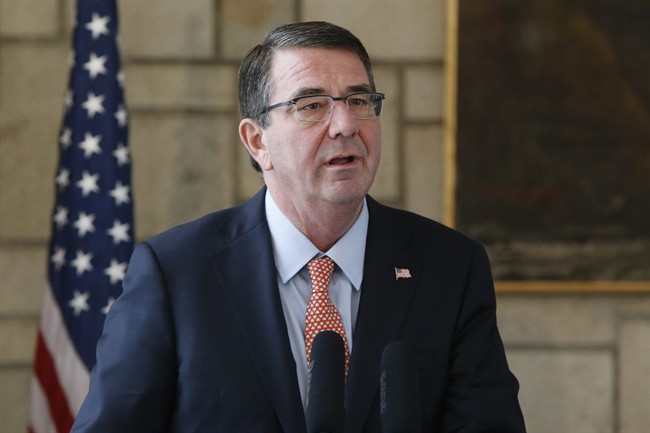BAGHDAD – U.S. Defence Secretary Ash Carter arrived unannounced in Baghdad on Thursday to assess the government’s progress in healing the country’s sectarian divisions and hear the latest on support for the Iraqi army’s coming attempt to recapture the key city of Ramadi from the Islamic State.

It is Carter’s first visit to Iraq since he took office in February.
Carter is not expected to announce any major change in U.S. strategy or increase in U.S. troop levels. The approximately 3,360 troops now in Iraq are largely involved in training Iraqi troops, advising Iraqi commanders on battle plans, and providing security for U.S. personnel and facilities. The U.S., joined by several coalition partners, also is conducting airstrikes daily to chip away at the Islamic State’s grip on large parts of Iraq.
The visit, however, comes at an important moment for the Iraqi government, which has announced a counteroffensive to retake Ramadi, the capital of Anbar province. The actual assault on the city has not yet begun, but a Pentagon spokesman, Army Col. Steve Warren, said it could start within several weeks.
The Ramadi campaign will be a crucial test not only for the Iraqi government led by Prime Minister Haider al-Abadi, but also for the U.S. strategy of relying on Iraqi security forces, operating in co-ordination with U.S.-led coalition airstrikes, to overcome the smaller Islamic State forces. President Barack Obama has opted not to commit U.S. ground combat forces to Iraq, saying the only lasting solution is for Iraq to fight for itself.
- Los Angeles wildfires: Alberta plans to send water bombers, other resources to California
- Jimmy Carter funeral: Former president praised for ‘character,’ humility
- Trump hush money sentencing to go ahead as U.S. Supreme Court rejects delay
- L.A. wildfires: U.S. asks Canada for resources as provinces send aid
American military leaders have said they would recommend to Obama that he approve moving U.S. military advisers and perhaps special operations forces closer to the front lines if they believed it would make a decisive difference at certain stages of the Iraqi campaign. But Warren said no such recommendation has yet been made. Obama’s critics in Congress complain that he is missing an opportunity to swiftly defeat the Islamic State by not sending U.S. ground combat troops or at least placing military advisers with Iraqi units to make them more effective.

Get breaking National news
Gen. Martin Dempsey, chairman of the Joint Chiefs of Staff, who visited Iraq last weekend, supports Obama’s approach. He told a congressional hearing July 7 that he realizes the Islamic State’s threat to the U.S. homeland “could increase” as a result of what he called a patient U.S. approach in Iraq and Syria.
“But I also would suggest to you that we would contribute mightily to ISIL’s message as a movement were we to confront them directly on the ground in Iraq and Syria,” he said, using an acronym for the Islamic State and alluding to the risk of enhancing the group’s ability to recruit fighters.
After Iraqi troops abandoned Ramadi in early May, handing the Islamic State its biggest battlefield victory of 2015, Carter caused a stir in Iraq when he said its army “just showed no will to fight.” That frank assessment exposed a central Iraqi weakness born of the country’s sectarian split.
Carter noted then that the Iraqi forces were not outnumbered in Ramadi, yet they abandoned their weapons and equipment, including dozens of American-supplied tanks, armoured fighting vehicles and artillery pieces. They became part of the Islamic State’s arsenal and were then targeted in U.S. airstrikes.
The Islamic State will again be outnumbered when, as expected, the Iraqi army makes a renewed assault on Ramadi. Warren, the Pentagon spokesman who is travelling with Carter, said there are between 1,000 and 2,000 Islamic State fighters in Ramadi. He would not say how many Iraqi troops are likely to undertake the Ramadi counteroffensive, but he said there are “several thousand” available in the area right now.
The U.S. accelerated and expanded its training effort in Anbar province earlier this summer, but Warren said that none of the Iraqi troops currently available for the Ramadi counteroffensive are among the nearly 7,000 regular Iraq army soldiers who have received U.S. training. He said the government has deployed those trainees elsewhere in the country, although he did not rule out that they might be added to the Ramadi force.
Warren said Iraqi security forces currently are carrying out “isolation operations” around Ramadi, meaning they are cutting off avenues of Islamic State resupply and reinforcement. Although under Iraqi command, the battle plan has been shaped to some degree by American advisers.
“We are beginning to isolate Ramadi from multiple directions,” Warren said, “… to place a noose around the city.” At a later stage – the timing of which he would not predict – the assault phase of the campaign will begin.
The loss of Ramadi was a major setback for Iraq, not just for the territory given up but for the psychological blow it inflicted on the security forces, whose confidence already was low. It also meant a delay in the push to retake a city of even greater strategic importance, Mosul in northern Iraq. Mosul has been in Islamic State hands since June 2014.
When Carter became Pentagon chief in February, replacing Chuck Hagel, U.S. military officials were talking openly about hoping the Iraqis would march on the city by May. Those hopes had faded even before Ramadi fell. Still, the current focus on recapturing Ramadi will eventually have to move to Mosul and other parts of western and northern Iraq if Obama’s vision of empowering a unified Iraq is to become reality.





Comments